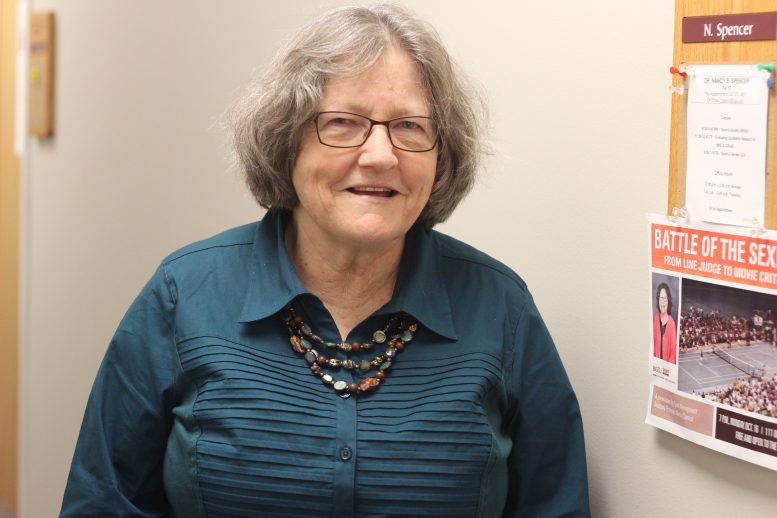By DAVID DUPONT
BG Independent News
When Nancy Spencer was offered the chance to be a line judge at the tennis match dubbed the Battle of the Sexes, she at first demurred.
Now a professor at Bowling Green State University, she was a 24-year-old at Corpus Christi, Texas, when former men’s tennis champion Bobby Riggs challenged women’s champion Billie Jean King to a match.
But a few months earlier Riggs, as much as showman as an athlete, had defeated Margaret Court. Spencer said she was so “devastated” by that outcome “I had told myself I wouldn’t watch the next match.”
Technically she wouldn’t be watching the match, the official said, she’d be watching the lines. He sweetened the deal by offering her a couple complementary tickets for friends and a pass that would allow her to tour the Astro Dome, then “the eighth wonder of the world,” where the match was being held.
So on Sept. 20, 1973, she was at the center line making calls for a match that made history. She was one of three women officiating the match.
In the wake of the release of the major motion picture “Battle of the Sexes,” starring Emma Stone and Steve Carell, Spencer will give a talk on her experience at the match Monday, Oct. 16, at 7 p.m. in room 111 in Olscamp Hall on the BGSU campus.
The match, Spencer said, was big news. Making the four-hour drive from Corpus Christi she stopped to get gas, and the attendant asked her out of the blue who she thought would win the match. Few people followed tennis at the time.
The event drew the largest crowd to watch a tennis match, 30,472. The crowd was packed with celebrities including sports figures such as Jim Brown and George Foreman and Hollywood stars such as Lee Major and Farrah Fawcett.
To warm up the crowd and the line judges, the main event was preceded by a celebrity mixed doubles event pitting Andy Williams and his wife, Claudine Longet, and Merv Griffin and actress Sandra Giles, who had dated Riggs.
Spencer said during the main event she was a little nervous, but ended up making only five or six calls. King and Riggs kept play on the edges of the court. The most nervous she got was when Riggs questioned a call. But she remained firm and confident of the call.
Of the actual tennis, she recalls little. She just concentrated on the line and blocked out what was happening on the court. Spencer said she did notice the player’s feet, especially the blue suede shoes King was wearing. Spencer later bought herself a pair.
“I do remember at one point I didn’t know if Bobby Riggs was going to step it up. I knew this match was going in Billie Jean’s favor. I realized he really wasn’t prepared.”
That was in contrast to his meeting earlier with Court.
Spencer puts the blame squarely on Court. “She choked. … She looked tight. She didn’t have the fight that Billie Jean had. She didn’t see it as a big deal, she saw it as ‘I can make $35,000.’”
Not so with King. After faltering in the early sets, she bore down, and easily defeated Riggs.
“The symbolism was important,” Spencer said.
“I was the first female assistant teaching pro at my club,” she said. After Court’s defeat “guys came up and said ‘I bet I could beat you.’”
She didn’t hear anything like that after the King-Riggs match. Instead when she got back to the club a 10-year-old girl gave her a bracelet with the scores of the games 6-4, 6-3, 6-3.
The match was a boon for women’s tennis. In 1970, the women had separated from the men’s tour because of the huge discrepancy in prize money. Now all the majors pay men and women the same.
But it was also a boost for tennis in general heightening fan interest.
Spencer herself was a late comer to the game. Growing up in North Canton, she loved baseball, and playing with boys in the backyard, and briefly on a softball team. “I was a Rocky Colavito fan.”
Then shortly before she entered high school, her parents moved close to the school that had brand new tennis courts. Spencer started to play, and her parents encouraged her taking her into Cleveland for lessons.
Spencer remembers being inspired by seeing Carole Gaebner on TV come from behind to win a match. At that time it was unusual to see women’s sports on TV.
She started playing tournaments when she was 15.
She set her sights high, and once asked a top pro if someone who started as late as her could be a champion. The pro replied candidly, “no.” The pro was Billie Jean King.
Spencer didn’t give up and made a place for herself in the game. That included a spot courtside when King scored a major win for gender equality.

